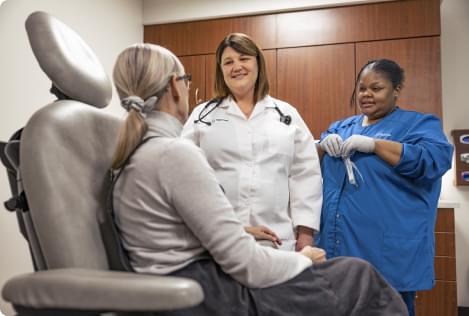Overview
Cold urticaria (ur-tih-KAR-e-uh) is a reaction that appears within minutes after skin is exposed to the cold. Itchy welts, also called hives, arise on affected skin.
Symptoms in people with cold urticaria can range from minor to serious. For some people with this condition, swimming in cold water could lead to low blood pressure, fainting or shock.
Cold urticaria occurs most often in young adults. If you think you have this condition, check in with your healthcare team. Treatment usually includes steps to keep cold urticaria from happening, such as taking antihistamines and staying away from cold air and water.
Symptoms
Cold urticaria symptoms may include:
- Temporary itchy welts, also called hives, on the area of skin exposed to cold.
- A response that worsens as the skin warms.
- Swelling of the hands while holding cold objects.
- Swelling of the lips from eating cold food or drinking cold beverages.
Serious responses may include:
- A whole-body reaction, also known as anaphylaxis. This can cause fainting, a racing heart, swelling of limbs or trunk, and shock.
- Swelling of the tongue and throat. This can make it hard to breathe.
Cold urticaria symptoms begin soon after the skin is exposed to a sudden drop in air temperature or cold water. Damp and windy conditions may cause symptoms to flare up. Each bout of symptoms may last for about two hours.
The worst reactions generally occur when all of the skin is exposed to cold, such as when swimming in cold water. These reactions could lead to fainting and drowning.
When to see a doctor
If you have skin reactions after being exposed to the cold, see your healthcare professional. Even if the reactions are mild, your healthcare professional will want to rule out other conditions that may be causing the symptoms.
Seek emergency care if your whole body is affected or you find it hard to breathe after suddenly being exposed to the cold.
Causes
No one knows what causes cold urticaria. You could have sensitive skin cells due to a virus or an illness or from a trait passed down in your genes. In the most common forms of this condition, cold causes the release of histamine and other chemicals into the blood. These chemicals cause itching, and they sometimes affect the whole body.
Risk factors
You're more likely to have cold urticaria if:
- You're a young adult. The most common type — primary acquired cold urticaria — occurs most often in young adults.
- You have another health condition. A less common type is secondary acquired cold urticaria. A condition such as hepatitis or cancer can cause it.
- You have certain traits. Rarely, cold urticaria is passed down to you in your genes. This type causes painful welts and flu-like symptoms after being exposed to cold.
Complications
The main possible complication of cold urticaria is a serious response that occurs after large areas of skin are exposed to the cold, such as when swimming in cold water.
Prevention
These tips may help stop cold urticaria from happening:
- Take an antihistamine available without a prescription as directed before being exposed to the cold.
- Protect your skin from the cold or sudden changes in temperature. If you're going swimming, dip your hand in the water first to see if your skin responds.
- Stay away from ice-cold drinks and foods to keep your throat from swelling.
- If your healthcare professional prescribed an epinephrine autoinjector, keep it with you to help stop serious responses from happening.
- If you're scheduled for surgery, talk with your surgeon ahead of time about your cold urticaria. The surgical team can take steps to help keep symptoms caused by cold from happening in the operating room.
Diagnosis
An ice cube is placed on your skin for five minutes to diagnose cold urticaria. If you have cold urticaria, a raised bump, also called a hive, will form a few minutes after the ice cube is taken away. This is called the ice cube or cold contact test.
In some cases, another condition, such as an infection or cancer, causes cold urticaria. This condition affects your immune system. If your healthcare professional thinks you have another condition that could be causing cold urticaria, you may need other tests.
Treatment
In some people, cold urticaria goes away on its own after weeks or months. In others, it lasts longer. While there is no cure for the condition, treatment and taking steps to avoid cold urticaria can help.
Your healthcare professional may recommend that you try to keep symptoms from happening or reduce those symptoms using home remedies. These remedies include antihistamines available without a prescription and staying away from the cold. If these treatments don't help, you may need prescription medicine.
Medicines used to treat cold urticaria include:
- Nondrowsy antihistamines. If you know you're going to be exposed to the cold, take an antihistamine ahead of time to help keep a response from happening. Examples include loratadine (Claritin, Alavert, others), cetirizine (Zyrtec Allergy, Zerviate, others), and desloratadine (Clarinex, Clarinex D 12-Hour, others). Some of these medicines are available without a prescription, while others require prescriptions.
- Omalizumab (Xolair). This prescription medicine, which is typically for people with asthma, has been used successfully to treat cold urticaria that doesn't respond to other medicines.
If you have cold urticaria because of another condition, you may need medicines or treatments for that condition as well. If you have a history of responses that affect your whole body, your healthcare professional may prescribe an epinephrine autoinjector (EpiPen, Auvi-Q, others) that you'll need to carry with you.
Self care
Antihistamines block the release of histamine that causes symptoms. These medicines can be used to treat mild symptoms of cold urticaria or to keep a response from happening. Medicines available without a prescription include forms of loratadine and cetirizine.
Preparing for your appointment
You'll probably see your primary care professional first. You also may need to see a healthcare professional who specializes in skin diseases, known as a dermatologist. Or you may need to see an allergy specialist, called an allergist-immunologist.
Preparing a list of questions for your healthcare professional will help you make the most of your time together. For cold urticaria, some questions to ask include:
- What's most likely causing my symptoms?
- What are other possible causes for my symptoms?
- How long will the hives last?
- What kinds of tests do I need? How do I get ready for these tests?
- What treatments do you recommend?
- Do these treatments have any side effects?
- Is there a generic alternative to the medicine you're prescribing?
- Will the recommended treatments affect the other conditions I have?
- Do you have any brochures or other printed material I can take with me? What websites do you recommend?
What to expect from your doctor
Your healthcare professional will likely ask you questions such as:
- When did you begin having symptoms?
- Have you recently been ill?
- Do others in your family have similar symptoms?
- Have you taken any new medicines recently?
- Have you tried any new foods?
- Have you traveled to any new places?
- Does anything seem to make your symptoms better or worse?
Preparing and expecting questions will help you make the most of your time.
What you can do in the meantime
If you're having mild hives, these tips may ease your symptoms:
- Protect affected areas from getting irritated.
- Stay away from whatever you think may have caused your response, such as facing into a cold wind or swimming in cold water.
- Reduce vigorous activity, which can irritate your skin more.
- Use antihistamines available without a prescription to help with itching.
© 1998-2026 Mayo Foundation for Medical Education and Research (MFMER). All rights reserved. Terms of Use


